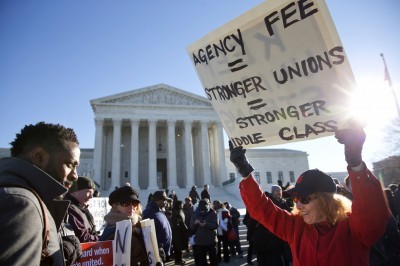-
Tips for becoming a good boxer - November 6, 2020
-
7 expert tips for making your hens night a memorable one - November 6, 2020
-
5 reasons to host your Christmas party on a cruise boat - November 6, 2020
-
What to do when you’re charged with a crime - November 6, 2020
-
Should you get one or multiple dogs? Here’s all you need to know - November 3, 2020
-
A Guide: How to Build Your Very Own Magic Mirror - February 14, 2019
-
Our Top Inspirational Baseball Stars - November 24, 2018
-
Five Tech Tools That Will Help You Turn Your Blog into a Business - November 24, 2018
-
How to Indulge on Vacation without Expanding Your Waist - November 9, 2018
-
5 Strategies for Businesses to Appeal to Today’s Increasingly Mobile-Crazed Customers - November 9, 2018
Public Employee Unions Take a Hit at the Supreme Court
A majority of the Supreme Court appears poised to overrule a 1977 case allowing public sector union “agency fees” – a ruling that would end the fees, which are paid by non-members to support public sector unions’ collective bargaining work.
Advertisement
The challengers in the case, Friedrichs v. California Teachers Association, argue they shouldn’t have to pay for any union services, on the theory that even basic functions such as collective bargaining are political speech because they involve requesting action from a government agency.
At issue are laws in California and 22 other states that authorize public employee unions to act as a bargaining agent and to collect fair-share (or agency) fees from all employees.
The lead plaintiff in the case is Rebecca Friedrichs, a public school teacher in Orange County, California, who says she left the California Teachers Association after becoming disillusioned with its mission.
Unions are concerned that a ruling throwing out the fees would give workers less incentive to join even if they generally agree with a union’s political stances because they would get all the benefits of collective bargaining without having to pay for it.
The Supreme Court heard oral arguments on Monday in a case that threatens to upend almost forty years of precedent and deal a major blow to public unions across the country.
Half the states already have right-to-work laws banning mandatory fees, but most members of public-employee unions are concentrated in states that don’t, including California, New York and IL.
Justice Anthony Kennedy said many teachers strongly disagree with the union’s position on tenure, merit pay and classroom size but are forced to subsidize it any way.
The problem comes when unions bargain with the state for benefits some teachers oppose.
Elrich noted that the many teachers in his family disagree about the union. Justice Antonin Scalia made his own views clear when he asked counsel for the plaintiffs Michael Carvin whether it would be okay to pass a law “to force somebody to contribute to a cause that he does believe in?” The appellants claim everything a government union does is political, so the fees violate employees’ constitutional free speech protections.
The court’s four liberal members were on the defensive, asking questions about whether there is good reason to overturn a 1977 precedent allowing the fees and potentially unraveling tens of thousands of collective bargaining agreements. The son of two parents who were teachers, and with eight relatives who also teach, Elrich was a union member for many years and once served as a union rep. But he found that the union “never played an important role in my school”.
A decision is Friedrichs v. California Teachers Association is expected by June 2016.
Friedrichs is a strong opponent of the $650 in yearly fees she says she is forced to pay, arguing that everything the union does is political. Those unions stand to lose fees from both workers who object to the positions the unions take and those who simply choose not to join while benefiting from the unions’ efforts on their behalf.
Advertisement
“Negotiations addressing routine employment matters – procedures for taking leave, for example, or the condition of faculty lounges, or the method for processing employee grievances – are not “political” in the sense the Supreme Court has used the word in other First Amendment settings, she wrote.





























